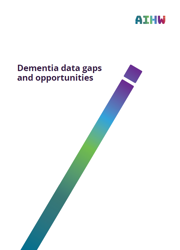Summary
The Australian Institute of Health and Welfare (AIHW) has produced 2 comprehensive reports on dementia in Australia (in 2007 and 2012) and in 2021 will release a third compendium on this major public health issue. The earlier reports were hampered by a lack of Australian prevalence data and other limitations in health and aged care data for addressing key policy questions about the extent and impacts of dementia on the Australian community and service systems.
This report takes a fresh look at the dementia data landscape in the light of changes in the health and aged care policy and data environments in recent years. It finds that some key data gaps persist—in particular, a lack of data on the diagnosis and management of dementia by general practitioners and other medical specialists—and that the My Aged Care system introduced in 2015 will only begin to deliver this year the data needed to support analysis of older peoples’ assessed care needs.
Clinical information systems and electronic health records offer the opportunity to address long-standing gaps in health system information on dementia. However, the literature depicts a fragmented service system for people with dementia that can be a barrier to obtaining a diagnosis and accessing early support, suggesting that this is not merely a ‘data gap’ issue. By addressing the service gaps, key data gaps could also be addressed with minimal additional outlay. Sweden and some other European Union countries have taken a clinical quality registry approach and this would appear to offer the best prospects for addressing the needs of Australians living with dementia and, at the same time, generating purposeful data for national dementia monitoring. Australia has established disease registries for many other health conditions and procedures—the expertise to establish a dementia registry most certainly exists here—but with no cure and limited treatment options, dementia may present challenges to participation in a national registry. The Australian Dementia Network’s current trial of a clinical quality registry for dementia is an important step in demonstrating the feasibility of this approach in the Australian context.
Linking existing administrative data from across the health and aged care systems appears to be the most feasible approach to dementia monitoring in the short to medium term. Data integration technology is proven, existing administrative data sets are generally of good quality, and the Australian Government’s Boosting Dementia Research Initiative has invested in improving dementia data and methods, including through data integration, over the period 2019 to 2021.
To support these and future efforts towards a fit-for-purpose Australian dementia evidence base, this report advocates for a national dementia data framework to be established. The framework would contain objectives and strategies for improving dementia data, through national cooperation. Ideally, this would exist not as a stand-alone framework but as an integral element of the next national dementia strategy. Beneath the data framework would sit a data development plan for dementia detailing governance and resourcing arrangements to ensure that the objectives of the national data framework could be achieved.
Complementing these dementia-specific data initiatives, an aged care data improvement plan is recommended to elevate data governance for aged care data to the level currently afforded to national health system data, ensure the integrity and continuity of data through periods of aged care policy and systems reform, and link aged care data governance with the proposed new national dementia data development plan.
Summary
Introduction
- Scope and method
- Report outline
Data sources
- Health system data developments
- Medicare Benefits Schedule and Pharmaceutical Benefits Scheme
- National Hospital Morbidity Database
- National Hospital Cost Data Collection
- National mental health-care data
- Causes of death data
- Australian burden of disease studies
- AIHW disease expenditure studies
- Primary care data developments
- Aged care data developments
- National Aged Care Data Clearinghouse
- My Aged Care reforms
- A new funding model for residential aged care
- Aged care data outside the NACDC
- National Disability Insurance Scheme data
- Income support data
- National surveys
- Survey of Disability, Ageing and Carers
- National health surveys
- Surveys of patient experiences of health care
- Bettering the Evaluation and Care of Health Survey
- Integrated data
- National Integrated Health Services Information Analysis Asset
- Multi-Agency Data Integration Project
- National Disability Data Asset
- Pathways in Aged Care 2014
Assessment results
Data gaps and opportunities
- Opportunities for health system data
- Opportunities for aged care data
- Opportunities for national surveys
- Conclusion
Appendix A: Tier 1 quality assessment for dementia data, Steps 1–2
End matter: Acknowledgments; Abbreviations; References; List of tables; List of boxes; List of figures; Related publications



